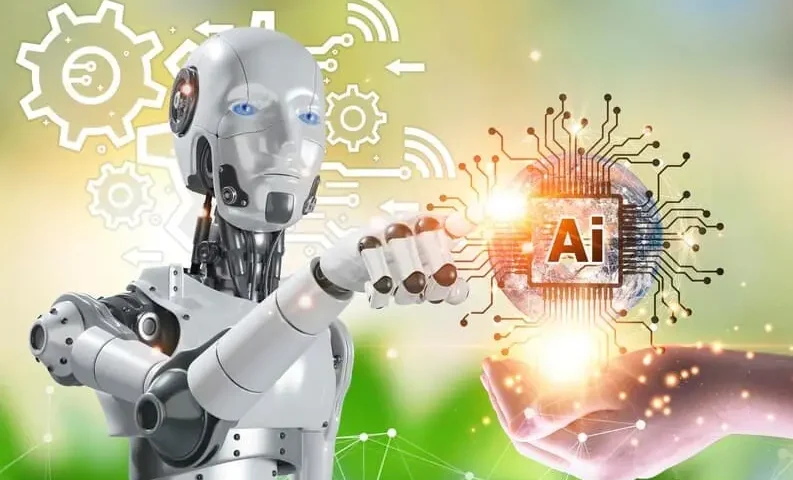
Introduction
Artificial Intelligence AI has become one of the most significant technological advancements of our time. With its ability to analyze vast amounts of data, learn from patterns, and make intelligent decisions, AI is transforming industries across the globe.
From healthcare and finance to manufacturing and transportation, the rise of AI is reshaping the way businesses operate. In this article, we will explore the various ways in which AI is revolutionizing industries, the challenges it presents, and the potential benefits it offers.
The Rise of Artificial Intelligence AI in Healthcare

Artificial Intelligence AI is revolutionizing the healthcare industry by improving diagnostics, enabling personalized medicine, and enhancing patient care. With AI-powered algorithms, doctors can analyze medical images, such as X-rays and MRIs, with greater accuracy and speed. AI can identify patterns and anomalies that human eyes might miss, leading to early detection of diseases and better treatment outcomes.
Artificial Intelligence AI in Diagnostics
AI is transforming the field of diagnostics by streamlining and enhancing the accuracy of medical tests. By analyzing patient data and medical images, AI algorithms can detect diseases and conditions more efficiently than traditional methods. For example, Artificial Intelligence AI can analyze retinal scans to identify signs of diabetic retinopathy, a leading cause of blindness. Early detection allows doctors to intervene promptly and prevent further complications.
Artificial Intelligence AI in Personalized Medicine
AI enables personalized medicine by analyzing vast amounts of patient data and genetic information. By understanding individual characteristics, Artificial Intelligence AI can help determine the most effective treatment plans tailored to each patient’s needs. This approach improves patient outcomes and minimizes adverse reactions to medications. AI can also predict disease progression, allowing doctors to intervene proactively.
Artificial Intelligence AI in Remote Patient Monitoring
With the rise of Artificial Intelligence AI, remote patient monitoring has become more accessible and accurate. AI-powered wearables and monitoring devices can track vital signs, detect abnormalities, and alert healthcare providers in real time. This technology is particularly beneficial for elderly or chronically ill patients who require continuous monitoring. It allows early intervention, reducing hospital readmissions and improving overall patient care.
The Impact of Artificial Intelligence AI on Finance

Artificial Intelligence is transforming the finance industry by automating tasks, enhancing fraud detection, and improving customer experiences. AI-powered algorithms can analyze financial data with remarkable speed and accuracy, enabling financial institutions to make data-driven decisions.
Artificial Intelligence AI in Automation
Artificial Intelligence AI is streamlining and automating routine financial tasks, such as data entry, reconciliation, and report generation. This frees up human resources to focus on more complex and strategic activities. AI-powered chatbots are also being deployed to provide personalized customer service and answer common inquiries, improving customer satisfaction.
Artificial Intelligence AI in Fraud Detection
The rise of Artificial Intelligence AI has significantly improved fraud detection in the finance industry. Machine learning algorithms can analyze vast amounts of transactional data and identify patterns indicative of fraudulent activities. AI can also detect anomalies in customer behavior, flagging suspicious transactions in real time. This proactive approach helps prevent financial losses and protects customer assets.
Artificial Intelligence AI in Investment and Trading
AI has transformed investment and trading practices by enabling algorithmic trading and predictive analytics. Machine learning algorithms can analyze market trends, news sentiment, and historical data to make data-driven investment decisions. This technology allows investors to identify opportunities and mitigate risks more effectively, leading to better investment outcomes.
The Rise of Artificial Intelligence AI in Manufacturing

Artificial Intelligence AI is revolutionizing the manufacturing industry by optimizing production processes, enhancing quality control, and improving supply chain management. AI-powered systems can analyze production data in real time, identify bottlenecks, and suggest process improvements, leading to increased efficiency and productivity.
Artificial Intelligence AI in Predictive Maintenance
AI enables predictive maintenance in manufacturing by analyzing sensor data and identifying patterns indicative of equipment failure. By predicting maintenance needs in advance, manufacturers can avoid costly unplanned downtime and optimize their maintenance schedules. This proactive approach reduces operational costs and improves overall equipment effectiveness.
Artificial Intelligence AI in Quality Control
With Artificial Intelligence AI, manufacturers can improve product quality control by analyzing sensor data and images during the production process. Machine learning algorithms can detect defects or variations that might go unnoticed by human inspectors. This technology ensures consistent product quality, reduces waste, and enhances customer satisfaction.
Artificial Intelligence AI in Supply Chain Management
AI is transforming supply chain management by optimizing inventory levels, improving demand forecasting, and enabling efficient logistics. By analyzing historical sales data, market trends, and external factors, Artificial Intelligence AI algorithms can accurately predict future demand. This helps manufacturers optimize their production schedules, reduce inventory holding costs, and meet customer demands more efficiently.
Conclusion
The rise of Artificial Intelligence AI is revolutionizing industries across the board, from healthcare and finance to manufacturing and beyond. AI’s ability to analyze data, make intelligent decisions, and automate tasks is transforming the way businesses operate.
It improves diagnostics, enables personalized medicine, enhances quality control, and optimizes supply chain management. While there are challenges in implementing AI, the benefits it offers in terms of efficiency, productivity, and customer experience make it a crucial component for businesses in the digital era.
FAQs
1: How is Artificial Intelligence AI revolutionizing the healthcare industry?
AI is revolutionizing healthcare by improving diagnostics, enabling personalized medicine, and enhancing remote patient monitoring. AI-powered algorithms can analyze medical images with greater accuracy, leading to the early detection of diseases.
AI also enables personalized treatment plans based on individual patient characteristics. Additionally, AI-powered wearables and monitoring devices facilitate remote patient monitoring, allowing for proactive interventions and improved patient care.
2: How does Artificial Intelligence AI benefit the finance industry?
AI benefits the finance industry by automating tasks, enhancing fraud detection, and improving customer experiences. AI automates routine financial tasks, freeing up human resources for more complex activities.
It also improves fraud detection by analyzing vast amounts of financial data and identifying patterns indicative of fraudulent activities. Additionally, AI enables data-driven investment decisions and personalized customer service, leading to better outcomes and increased customer satisfaction.
3: What impact does Artificial Intelligence AI have on the manufacturing industry?
AI has a significant impact on the manufacturing industry by optimizing production processes, enhancing quality control, and improving supply chain management. AI-powered systems analyze production data in real time, identifying bottlenecks and suggesting process improvements. This leads to increased efficiency and productivity.
AI also improves quality control by detecting defects or variations that might go unnoticed by human inspectors. Furthermore, AI optimizes inventory levels, improves demand forecasting, and enables efficient logistics, enhancing overall supply chain management.
4: What are the challenges of implementing Artificial Intelligence AI in industries?
Implementing AI in industries comes with challenges such as data privacy and security concerns, ethical considerations, and the need for workforce upskilling. Protecting sensitive data and ensuring cybersecurity measures are crucial when implementing AI systems.
Ethical considerations arise regarding the use of AI, such as bias in algorithms or the impact on jobs. To fully leverage AI’s potential, businesses need to invest in upskilling their workforce to adapt to changing roles and responsibilities.
5: How can businesses leverage Artificial Intelligence AI to their advantage?
Businesses can leverage AI to their advantage by implementing AI-powered systems for automation, data analysis, and decision-making. AI can streamline routine tasks, freeing up human resources for more strategic activities.
It can also analyze vast amounts of data to identify patterns and insights that can inform data-driven decision-making. By embracing AI, businesses can increase efficiency, optimize processes, and gain a competitive edge in their respective industries.
6: What is the future of Artificial Intelligence AI in industries?
The future of AI in industries is promising, with advancements in machine learning, natural language processing, and robotics. AI will continue to transform industries by improving efficiency, productivity, and customer experiences.
The integration of AI with other emerging technologies, such as the Internet of Things (IoT) and blockchain, will further expand its applications. As AI continues to evolve, businesses need to adapt and embrace these technologies to stay ahead in the ever-changing landscape.
Chat GPT Can Play the Role of a Doctor?




